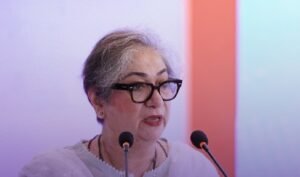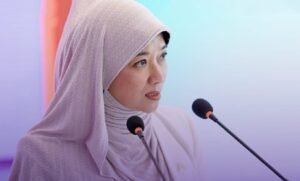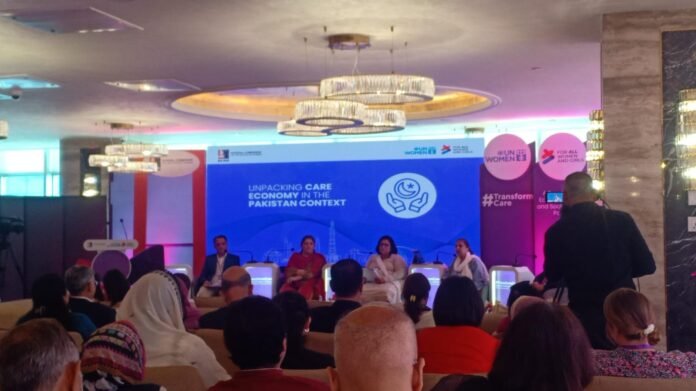Pakistan Unveils Landmark Care Economy Roadmap with UN Women, NCSW, and Global Partners</strong>
Roadmap Aims to Boost Women’s Workforce Participation and Economic Growth
Islamabad – 11 September 2025 (Adnan Hameed) : Pakistan has taken a landmark step toward redefining its care economy with the launch of the “Transforming Care Systems: A Roadmap for Economic Growth and Social Equity in Pakistan”, introduced at a two-day multi-stakeholder forum in Islamabad organized by UN Women and the National Commission on the Status of Women (NCSW). The event gathered federal and provincial representatives, civil society groups, media, academics, private sector leaders such as Jazz, and international partners including UNICEF, ILO, and the Government of Norway.
The initiative emphasizes the urgent need to value and invest in both paid and unpaid care work—covering childcare, eldercare, healthcare, and domestic responsibilities—disproportionately borne by women, who spend up to 10 times more hours on unpaid care work than men. Experts highlighted that strengthening care infrastructure could boost women’s labor force participation, currently at 22%, and potentially add trillions of rupees to the GDP over the next decade.

UN Resident Coordinator Mohamed Yahya said that in a transformed care system, we envision societies that truly value care as the cornerstone of human and economic development, where care is recognized as a skilled profession, essential to our society, and acknowledged as a fundamental human right.

NCSW Acting Chair Umme Laila Azhar remarked that, this is not just a conversation about services it’s about ensuring that every woman is treated with the dignity she deserves and that her unpaid work is visibly valued and supported.

Ar. Siti Rozaimeriyanty Dato Haji Abdul Rahman, Secretary-General of AIPA, highlighted that Pakistan’s leadership in prioritizing care has regional importance. She said inclusive and sustainable care systems strengthen economies, bring societies together, and create a shared path for progress across Asia.
Kazim Mujtaba, President of Jazz Consumer Division, stressed that the private sector must see care as an opportunity rather than a challenge. He noted that investing in care solutions not only empowers women to join the workforce but also boosts the economy and builds stronger businesses.
The forum brought together an impressive lineup of distinguished speakers, including Dr. Sharmila Faruqi (Member of the National Assembly), Jamshed M. Kazi (UN Women Pakistan Country Representative), Sharmeela Rassool (UNICEF Deputy Representative), Dr. Lubna Shehnaz (PRIDE Consulting), Gulmina Bilal (Chairperson, NAVTTC), Durreshahwar (Pakistan United Workers Federation), Muhammad Jahangir (Handicap International), Dr. Dure Nayab (Director, Socioeconomic Insights & Analytics), Humaira Zia Mufti (Secretary, NCSW), Ivo Spauwen (ILO), and Summaiya Bushra (BOPinc).
The forum concluded with the adoption of Pakistan’s first Care Economy Roadmap, a policy framework aligning with the FY2025–26 gender-responsive budget, international commitments, and the UN Sustainable Development Goals (SDGs). This roadmap will guide reforms, resource allocations, and partnerships, positioning Pakistan as a regional model in advancing inclusive economic growth, gender equality, and social equity through transformative care systems.

The session concluded with the closing remarks of Per Albert Ilsaas Ambassador of Norway to Pakistan, he said that advancing Pakistan’s first Care Economy Roadmap will not only address pressing social needs, but also drive economic resilience and inclusive growth, while aligning with global goals such as the Sustainable Development Goal 5 on gender equality and Goal 8 on decent work and economic growth.







